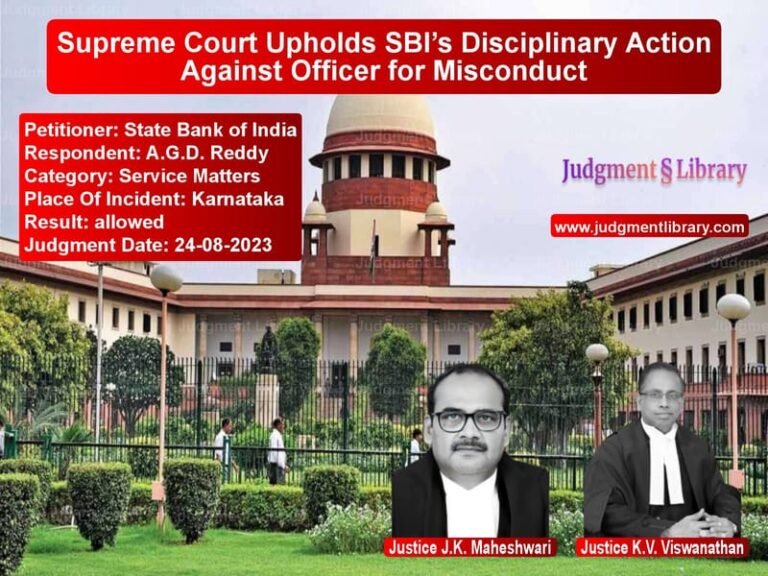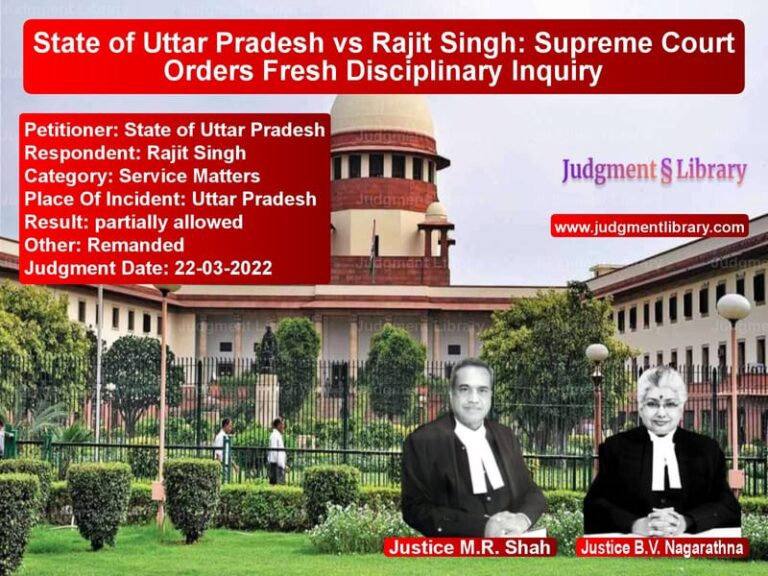Excise Duty Evasion: Supreme Court Upholds Prosecution Against Reliance Industries
The case of Chandpaklal Ramanlal Shah and Anr. vs. Reliance Industries Ltd. is a significant ruling in the realm of excise duty evasion and the legal consequences of omitted procedural rules. The Supreme Court examined whether the omission of Rule 56A of the Central Excise Rules, 1944, impacted an ongoing prosecution under Section 9 of the Central Excises and Salt Act, 1944. The judgment is crucial for its interpretation of procedural lapses in tax-related prosecutions and the applicability of statutory provisions to ongoing cases.
Background of the Case
The dispute arose from an excise duty evasion case filed by the appellant, Chandpaklal Ramanlal Shah, who was then serving as Superintendent of Central Excise. The complaint, filed on August 4, 1987, alleged that Reliance Industries Ltd. had violated several provisions of the Central Excise Act, including Rule 56A, and had taken credit without following the prescribed procedure.
The case proceeded in the trial court, which framed charges against Reliance Industries Ltd. under:
- Section 9 of the Central Excises and Salt Act, 1944
- Rules 52A, 56A, 173G, 9(2), and 173(Q) of the Central Excise Rules, 1944
- Section 11-A of the Central Excises and Salt Act, 1944
However, during the pendency of the case, Rule 56A was omitted by a notification on May 20, 1994. Following this, Reliance Industries Ltd. filed an application for discharge, arguing that since Rule 56A had been omitted without any saving clause, the prosecution should be quashed.
The trial court rejected the discharge application and framed charges against the company on March 22, 2013. Dissatisfied with this order, Reliance Industries Ltd. moved the Gujarat High Court in Criminal Revision Application No. 192 of 2014. The High Court set aside the trial court’s order, holding that the omission of Rule 56A nullified the prosecution. Aggrieved by this decision, the appellant approached the Supreme Court.
Arguments of the Petitioner (Chandpaklal Ramanlal Shah)
- The prosecution was not based merely on Rule 56A but also on Section 9(1)(b) of the Central Excises and Salt Act, 1944, which remains in force.
- The evasion of excise duty was the primary offense, and the omission of Rule 56A did not change the fact that duty had been evaded.
- The omission of a procedural rule should not invalidate an ongoing prosecution, especially when the charge is for substantive tax evasion.
- Section 6 of the General Clauses Act, 1897, applied to the omission of Rule 56A, allowing for the continuation of proceedings initiated under that rule.
- Section 38A of the Central Excise Act, introduced through the Finance Act, 2001, clarified that actions taken under omitted provisions would not be invalidated.
Arguments of the Respondent (Reliance Industries Ltd.)
- The omission of Rule 56A, without a saving clause, meant that any prosecution under this rule was no longer valid.
- Section 6 of the General Clauses Act applied to the repeal of statutes but not to the omission of subordinate legislation such as rules.
- The explanation to Section 132 of the Finance Act, 2001, stated that acts or omissions that would not have been punishable but for the amendment could not be prosecuted.
- The omission of Rule 56A was akin to a repeal, and since no retrospective provision had been made to continue prosecutions under it, the case against Reliance Industries Ltd. should be dismissed.
Supreme Court’s Observations
The Supreme Court analyzed the arguments and made the following key observations:
- The charge against Reliance Industries Ltd. was for evasion of excise duty, which remained an offense under Section 9(1)(b) of the Central Excises and Salt Act, 1944.
- The omission of Rule 56A did not impact the core allegation that excise duty had been evaded.
- Section 6 of the General Clauses Act applies to the repeal of laws and extends to the omission of rules, allowing pending prosecutions to continue.
- Section 38A of the Central Excise Act, introduced in 2001, provided statutory recognition to the continuation of actions taken under omitted provisions.
- The Gujarat High Court erred in treating the omission of Rule 56A as a ground to dismiss the prosecution, as the charge of excise duty evasion was still legally valid.
The Court emphasized:
“The omission of a procedural rule for availing credit cannot in any manner affect the charge of excise duty evasion. The prosecution cannot be deprived of the opportunity to prove evasion, which by itself is an offense.”
Final Ruling
The Supreme Court allowed the appeal, setting aside the Gujarat High Court’s order and reinstating the trial court’s decision to frame charges. The key directives were:
- The prosecution of Reliance Industries Ltd. under Section 9(1)(b) of the Central Excise Act, 1944, would proceed.
- The omission of Rule 56A did not invalidate the prosecution, as excise duty evasion remained an offense.
- The trial court’s order framing charges against Reliance Industries Ltd. was restored.
Conclusion
The Supreme Court’s ruling reaffirms the principle that procedural omissions do not automatically nullify substantive charges. This judgment strengthens tax enforcement by ensuring that procedural gaps do not allow evaders to escape liability. It also sets a crucial precedent on the applicability of statutory provisions to ongoing legal actions, ensuring that excise duty evasion cases can be pursued irrespective of procedural rule changes.
Don’t miss out on the full details! Download the complete judgment in PDF format below and gain valuable insights instantly!
Download Judgment: Chandpaklal Ramanlal vs Reliance Industries Supreme Court of India Judgment Dated 12-09-2017.pdf
Direct Downlaod Judgment: Direct downlaod this Judgment
See all petitions in Income Tax Disputes
See all petitions in Tax Evasion Cases
See all petitions in Banking Regulations
See all petitions in Judgment by Adarsh Kumar Goel
See all petitions in Judgment by Uday Umesh Lalit
See all petitions in allowed
See all petitions in supreme court of India judgments September 2017
See all petitions in 2017 judgments
See all posts in Taxation and Financial Cases Category
See all allowed petitions in Taxation and Financial Cases Category
See all Dismissed petitions in Taxation and Financial Cases Category
See all partially allowed petitions in Taxation and Financial Cases Category







